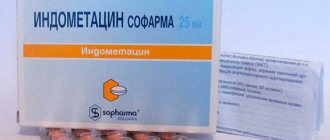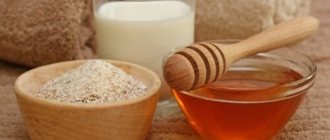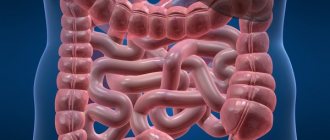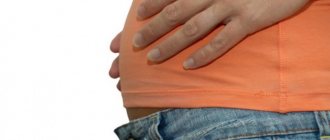Causes
Non-pathological
- Secretion of protective mucus by the intestinal wall. The digestive system has a very thin shell, which is easily injured by mechanical or chemical factors. Therefore, the intestinal wall produces protective mucus, which envelops the bolus of food and promotes its movement through the gastrointestinal tract. In addition, mucus fills all microdamages of the organ shell and promotes their rapid healing. Normally, intestinal mucus appears as a white or yellowish substance with a jelly-like consistency. A small amount of mucus covering the stool is normal. If the content of the substance is high, it is worth suspecting some kind of intestinal disease, especially if there are other symptoms of damage to the digestive system.
- Nutritional features. Increased mucus production may be caused by drastic changes in the patient's diet. Some foods can stimulate the production of protective substances - bananas, oatmeal, flax seeds, cottage cheese, watermelons. In this case, mucus secretion should not be abundant and constant, and other intestinal symptoms should be absent.
Pathological causes
- Dysbacteriosis. Disruption of the intestinal microflora causes digestive dysfunction, which is also manifested by the release of mucus in the feces.
- Food allergies. When products to which the patient is allergic enter the body, his intestines strive to limit contact with this product as much as possible. One of the protective ways is enveloping the mucous membrane.
- Inflammatory processes in the intestines. This group includes both specific infections (dysentery, escherichiosis) and nonspecific enterocolitis.
- Autoimmune processes. The most severe intestinal pathologies are ulcerative colitis and Crohn's disease, which are presumably of an autoimmune nature. One of the symptoms in the clinical picture of the disease is the release of blood and mucus with feces.
- Irritable bowel syndrome. The disease belongs to the group of functional disorders of the digestive system caused by dysfunction of peristalsis. During the period of activation of intestinal muscle contractions, the patient increases the secretion of mucus in the intestinal lining.
- Pathologies of the rectum. Mucus discharge can be a symptom of rectal pathologies - hemorrhoids or anal fissures.
- Defects of intestinal enzyme systems. Some patients have a genetically determined deficiency of any digestive enzyme, which leads to impaired digestion of certain foods. Thus, with lactase deficiency, milk and fermented milk products cannot be digested; with celiac disease, products containing gluten cannot be digested. When food containing these substances enters the body, the patient experiences symptoms of indigestion, one of which is excessive secretion of intestinal mucus.
Health benefits of citrus fruits
Health benefits of citrus fruits
The most pleasant way to cleanse the body of parasites using folk remedies and at the same time get rid of accumulated pathogenic mucus is by consuming citrus fruits.
You need to take about 2 liters of boiled water, pour in 0.5 liters of just squeezed grapefruit juice, the same amount of orange juice and finely chop 1 lemon.
Drink no more than 100 milliliters daily in the morning on an empty stomach. It is not advisable to overdo it with tincture - it can increase acidity.
The most common diseases accompanied by mucus secretion
Dysbacteriosis
Dysbacteriosis is a pathology that is characterized by changes in the composition of the intestinal microflora. Beneficial bacteria that live in a healthy digestive system die, and they are replaced by opportunistic and pathogenic forms of microorganisms. In addition to increased mucus secretion, this condition is characterized by the occurrence of diffuse abdominal pain, diarrhea or constipation, sleep disturbances, appetite, and the appearance of characteristic skin rashes. After restoring the microflora with probiotics or prebiotics, all symptoms usually go away without any complications.
Inflammatory processes in the intestines
Among specific intestinal infections, dysentery deserves the most attention. In this condition, the patient experiences vomiting, diarrhea, changes in the nature of stool (loose stools mixed with mucus and blood), general deterioration of the condition - fever, weakness, headache, dehydration. It is very difficult to eliminate an infection at home, so the patient is usually hospitalized in a specialized infectious diseases hospital and undergoes a course of antibiotic treatment there.
Nonspecific enterocolitis can be caused by opportunistic flora - Escherichia, staphylococci. Such infections usually have a milder course. Mild foodborne illness can be treated at home, but if the patient’s condition is severe, hospitalization may also be required.
Irritable bowel syndrome
Irritable bowel syndrome is an unpleasant disease that is characterized by a pathological increase in peristalsis in the digestive system. The main manifestation of the pathology is frequent bowel movements (sometimes up to 15-20 times a day), while the stool becomes liquid, with impurities of blood and mucus. In some patients, bouts of diarrhea may alternate with periods of constipation. Other symptoms of the pathology may include colic, nausea, and severe dry mouth. The patient often experiences general manifestations of the disease - sleep disturbances, headaches, constant fatigue, increased fatigue.
Anal fissures
Anal fissures are a common cause of mucus discharge in stool. These injuries are usually localized inside the anal canal, in some cases they occur directly in the anus. The appearance of a fissure is associated with unpleasant itching and pain in the anus, discharge of blood and mucus. When a crack is injured or an infection occurs, the pain usually intensifies.
Colorectal cancer
Main article: Colorectal cancer: symptoms and treatment
The release of mucus in the stool in elderly patients is a reason to suspect the presence of cancer in the colon or rectum. This condition is most common after age 50, but can also occur in younger people. Symptoms associated with colorectal cancer include alternating bouts of constipation and diarrhea, abdominal pain, and blood and mucus in the stool.
General symptoms quickly appear - constant weakness, fatigue, apathy, loss of appetite, weight loss (even cachexia). The distinctive features of cancer symptoms are their gradual development and persistence. Therefore, if you have regular digestive disorders, it is necessary to undergo a screening colonoscopy to exclude the diagnosis of a colorectal tumor.
Drugs that remove mucus from the body
Sometimes, to activate the process, it is necessary to use medications that remove mucus from the body.
Expectorants for the lungs.
- Sputum thinners: Lazolvan, Ambroxol, Bromhexine and ACC.
- Stimulating expectoration: Coldrex, Tussin, preparations based on herbal remedies - marshmallow root, thermopsis herb, terpin hydrate, essential oils.
How to remove mucus from the body medically when cleansing the intestines? Use mild laxatives:
Food supplements with plant fibers can be used for long-term use:
You can buy bran in bags at grocery stores.
Differential diagnosis of the causes of mucus in the stool
Differential diagnosis of diseases that can lead to the appearance of mucus in the stool is carried out by analyzing the complete clinical picture of pathologies. The inflammatory process is characterized by an acute course, rapid onset of general symptoms, and loose, watery stools. With hemorrhoids and anal fissures, the disease has a more gradual course, the patient experiences pain in the anus, stools are formed, mucus and blood are released before or after direct bowel movement.
In autoimmune processes, scanty stool is more typical, feces are practically absent, and the bulk of the stool consists of mucus and blood. For fermentopathies (celiac disease, lactase deficiency), polyfecality, the release of undigested food debris, and the presence of flatulence are observed. Irritable bowel syndrome is characterized by mushy stools, which may be absent (during periods of constipation); copious bowel movements are usually provoked by stress factors.
Ways to cleanse the digestive system
It is with cleansing the digestive tract that one must begin to get rid of mucus in the body. Symptoms of the accumulation of pollution will be constant constipation, flatulence, kidney disease, liver disease, and allergies.
This recipe will help remove impurities from the stomach. Grate the horseradish root. Juice is squeezed out of five lemons. Horseradish (150 g) is mixed with juice. Take 1 small spoon of this mixture in the morning and evening. You need to wash it down with carrot juice.
An effective way to cleanse the intestines of mucus is an enema. Warm, slightly salted water is used for the procedure. You can take chamomile infusion. If an enema is not suitable for some reason, a laxative is taken. In this case, there is no need to have dinner.
Treatment
Etiological treatment
Etiological treatment depends on the cause of mucus in the intestines. For inflammatory pathologies, antibacterial therapy is used; for autoimmune pathologies, glucocorticoids are prescribed. The presence of colorectal cancer requires radical surgical therapy in combination with chemotherapy and radiation. When dysbiosis is treated with probiotics or prebiotics.
Nutrition
During the treatment period, the patient is recommended to adhere to a diet. It is necessary to completely exclude fatty and fried foods, alcohol, strong tea or coffee from the diet. The diet should consist of porridges with water, vegetable soups, and fermented milk products. You need to eat often, but in small portions.
General recommendations
During treatment, patients need to:
- do special exercises to massage the abdominal organs;
- take more walks when you are fresh;
- take a course of multivitamins;
- get enough sleep regularly;
- to refuse from bad habits.
Alternative Medicine for Safe Cleansing
A form of Indian alternative medicine, Ayurveda, offers five steps to cleanse the body of excess mucus.
Anointing
At this stage, the patient takes castor oil, known for its powerful laxative effect. Dosage – 2-4 tablespoons for 2 or 3 days.
During the period of anointing, you can use other oils; the varieties are selected depending on the patient’s physique.
Vaman or therapeutic vomiting
Suitable for removing stagnant phlegm from the stomach. Based on an early hearty breakfast of wheat porridge with milk, half a teaspoon of dried madan phal fruit paste with honey and a generous portion of tea with licorice.
After a heavy meal, the temperature rises, and then vomiting occurs.
With proper preparation, the procedure does not cause any particular inconvenience and lasts no more than an hour. The taste of the vomit should be bitter or sour.
The norm after such manipulations is loose stools due to the effect of licorice on the small intestine. Until the middle of the day, you should protect yourself from stress, do not eat, drink only rice water. It is not recommended to eat heavy food during the day.
- Pleurisy;
- Hepatitis;
- Physical or nervous exhaustion;
Mucous formations in the intestines
As a variant of the norm
In a normal state of health, a mucous inclusion comes out of the body with feces, since the intestines are covered with a protective film of mucus. It has protective properties, prevents pathogenic microflora from multiplying, and promotes rapid healing of microwounds and cracks. Thanks to mucus, the process of defecation does not cause discomfort, and its discharge is found in the feces.
Like pathology
If, during a bowel movement, a lot of mucus with blood is visible in the stool, it has an unnatural color, and sometimes an odor, you need to sound the alarm and seek medical help, because the cause of this pathology is often dangerous. A lot of mucus in the rectum indicates that inflammatory processes are occurring in the organ, which manifest themselves both on their own and as a result of a more serious illness in the body. The tissues of the organ are deformed, swelling appears, which causes pain and discomfort during bowel movements, and mucus is released from the body in large quantities. In advanced cases, purulent processes occur, in which purulent masses come out along with feces.
Manifestation of the disease.
Drugs
After the diagnosis has been established and the root cause of the disease has been found, the patient is prescribed medication, a special diet, and adherence to a daily and nutritional regimen. If the disease develops as a result of bacterial infection or infection, a course of antibiotics is prescribed. For dysbacteriosis, drugs are used that normalize the intestinal microflora and suppress the proliferation of pathogenic microflora.
Thick mucus in the throat usually accumulates in the morning. The adhesion of a viscous substance causes coughing, which is not accompanied by changes in the structure of the lungs. Sometimes the gastric fluid goes back into the pharynx and irritates it with its aggressive action.
This sometimes causes mucus to accumulate in the throat, causing coughing and muscle spasms, which can lead to the feeling of a lump in the throat. If the contents of the stomach are acidic, the sticking of a viscous substance will be accompanied by heartburn.
Prevention
If you have problems with the intestines and disruption of its functioning, you need to constantly monitor your health, follow a diet and be under the supervision of a gastroenterologist. If suspicious symptoms appear, you should not delay and self-medicate. Sometimes mucus in the stool is the result of poor nutrition and it will be enough to cleanse the intestines and its functioning will be restored. But in some cases, such pathology also manifests itself in serious, severe diseases, such as rectal cancer, duodenal ulcer, and polyposis of the organ. With such diseases, you cannot waste time, as complications can cost the patient his life.











